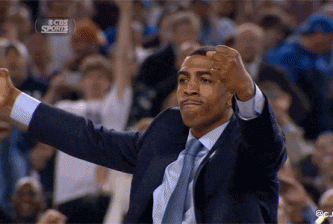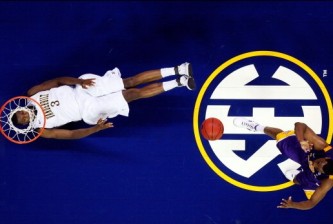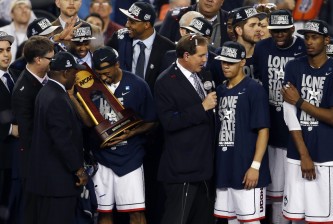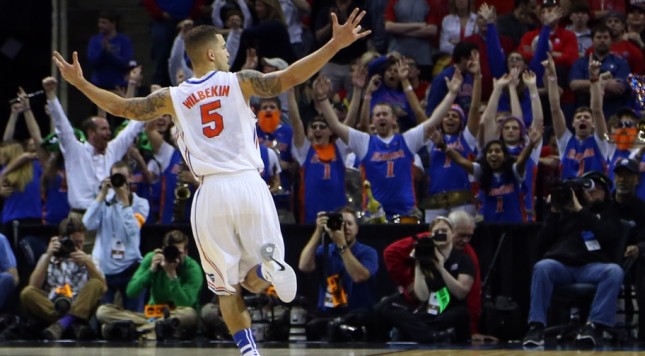The Florida Gators — winners of 29 games in a row; owners of a perfect SEC record this season; holders of the No. 1 overall seed in the 2014 NCAA Tournament — were greatly burdened entering Saturday’s South Regional final against the Dayton Flyers.
No, really, they were.
It’s true that all programs would love to carry the oppressive weight shouldered by the Gators heading into this Elite Eight encounter. Yet, the load resting on Florida’s back was considerable.
*
You might lament this (or you might not), but in American sports culture, the worst kind of loss is the loss in the game before the big stage.
If you lose one game short of the Super Bowl, your NFL season feels empty. Super Bowl losses sting, and American sports culture definitely has a problem accepting second-place finishers as great teams, but the losers of conference championship games don’t get to take the ride in the spotlight both Super Bowl teams enjoy. The same is true for the NBA Finals and the World Series. Coaches and athletes don’t take losing easily — they shouldn’t, and they never will — but they live to play on the grand stage. Losing one step short of that theater of dreams is something which cuts more deeply over the course of an offseason.
In college basketball, the national championship is the undeniable end goal, but the Final Four is the most attainable annual destination for the broad swath of upper-tier programs in the sport. Only eight schools have won more than two national titles; if taking home the trophy was so easy, more programs would have accomplished the feat by now.
The Final Four — the product of mastering two NCAA tournament weekends, not three — is a far more accessible prize for its pursuers. Unless you’re a team such as 1991 UNLV, 1992 Duke, or 2009 North Carolina, making the Final Four marks a season that can be considered a success without any question or qualification. Coaches and teams don’t get remembered for making Elite Eights. They’re remembered for taking that extra step.
Right or wrong, that’s the way things are. Losing one step before reaching The Place You Want To Reach is the most painful loss in the rarefied air of big-boy athletic competition.
Very simply, then, the Florida Gators lost that precise game in each of the past three seasons.
*
Running into bad weather after climbing 90 percent of Mount Everest and having to cancel the remainder of the expedition — that’s what each of the past three seasons felt like for Florida. As a 2 seed in 2011; a surprising 7 seed in 2012; and as a strong but flawed 3 seed in 2013, Florida won three NCAA tournament games, but that thorny fourth game proved to be a source of acute agony.
In 2013, Florida simply had the proverbial “bad day at the office” against Michigan. That kind of loss will happen from time to time. The Elite Eight games which truly hurt the Gators in this three-year stretch were their losses in 2011 (Butler) and 2012 (Louisville). In each of those contests, Florida owned 11-point leads with under 10 minutes left in regulation and couldn’t hold on.
Don’t think that the Gators, especially their seniors, were ignorant of this fact as they took a 14-point halftime lead over Dayton and then watched that lead get trimmed to eight in the first minute-plus of the second half. This season, for all its riches and achievements through Thursday night’s Sweet 16 win over UCLA, Florida had to slay its Elite Eight dragon to sleep peacefully.
Failing to win a national title next weekend in JerryWorld — the same place where its Final Four hopes were dashed by Michigan a year ago — will naturally wound the Gators. Failing to return to the home of the Dallas Cowboys would have left a decorated senior class bereft of even one non-spectator experience at college basketball’s signature event. Being a top seed with a comparatively favorable NCAA tournament draw certainly confers its share of advantages, but the flip side of such a reality is that if you don’t make the Final Four, you can easily be viewed by the larger culture as a failure.
This isn’t right, but it’s real. Such a line of thought has been visible enough to notice in recent years, especially after each “almost-but-not-quite” Florida season, brought to a halt one stop before the Final Four. The line of thought is expressed in this question:
“Other than the great Noah-Horford-Green-Brewer NBA teams, what has Billy Donovan done?”
It seems absurd, and people in the know in college basketball don’t give it one ounce of credence, but across the vast expanse of the country, that’s precisely the kind of (unfair) mentality which can arise when a team loses the game before the big stage.
Even if your first instinct is to (rightly) laugh at the notion that Billy Donovan’s coaching resume was still somewhat thin before today, there is often a tiny grain of truth in even the most uncharitable claims. For the Donovan skeptics, that grain of truth was this: Since 2001, only one great nucleus of players (Joakim Noah, et al.) had subsequently lifted Donovan to a Final Four.
American cultural attitudes are defined in many ways by the central notion that abundance is never enough and that there’s always more to gain, be it sex, power, money, fame, or achievements. Yet, while appetites are often unlimited in this culture, it’s reasonable to argue that one — albeit only one — additional Final Four was needed to fully eradicate the idea that Florida has left money on the table over time.
That moment has now arrived, and the point should lie beyond dispute forever and ever.
If the past three seasons left a bitter taste in Gainesville and tagged Florida as an “almost” program except for those two great seasons from one of the all-time great teams in the sport’s history, this win over Dayton has profoundly changed the way Donovan and Florida should be seen for those fence-sitting skeptics who ignored a steady stream of regular season successes.
Think of Final Fours this way as a measurement of achievement:
When you dominate your conference; win your conference tournament; set all sorts of records; and generally create an annual track record of high-level consistency, you can take solace in such accomplishments if you don’t make the Final Four. The downside of such a reality is that the programs which struggle throughout the regular season but get hot at tournament time still jump the line and get ahead of you in the court of public opinion.
However, when you reach so many regular season milestones and accumulate so many honors from early November through Selection Sunday, the subsequent addition of a Final Four appearance to your portfolio of achievements will lift your program past the “get hot in March” section of the Final Four club.
This victory over Dayton in Memphis is so valuable not just because it has allowed Florida’s senior class to take a bow inside a big dome next weekend, in front of over 70,000 fans; this cathartic, over-the-hump conquest makes the Gators the kind of program just described, the one that combines regular season success with postseason superiority.
Next weekend will be written about in great detail, to be sure. Plenty will be said about Florida’s 30-game winning streak entering JerryWorld.
For now, though, Florida has truly overcome the most pressure-packed moment of its season, the moment freighted with the largest quantity of disappointment had it turned the wrong way. The Gators will shoulder quite a bit of pressure in Arlington, Tex., on April 5. Yet, that pressure will be decidedly different from what Billy Donovan’s players handled in Memphis.
No matter what you thought of Florida basketball heading into today, the Gators’ encounter with pressure next week rates as a “first-world college basketball problem.” That statement is more true than you think, too:
Florida — if there was any lingering shred of doubt before the 2014 South Regional final — is now very much a first-world college basketball program in full, a member of the sport’s ruling class.
That’s what happens when the marvelous accomplishment of three straight Elite Eights gives way to a Final Four.























